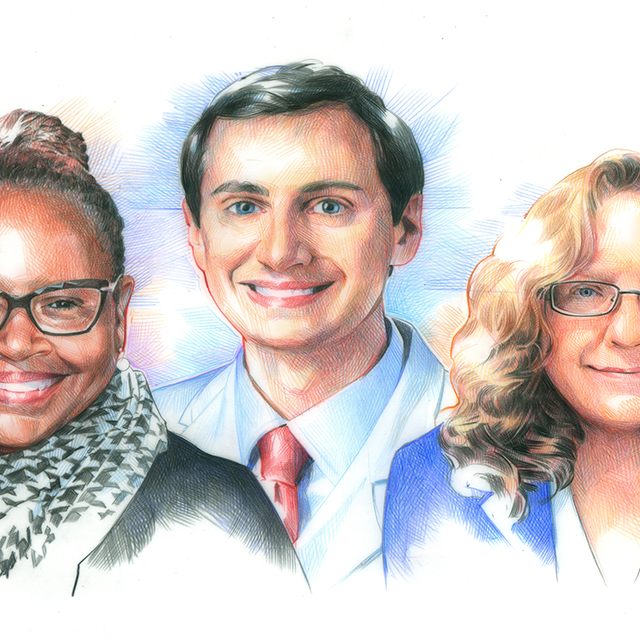Valarie Bowman works in a world where phones ring incessantly and emergencies demand immediate attention. Emails pour in from physicians, patients, call centers and insurers. The colorectal surgeries she coordinates are often cancelled or delayed, requiring rescheduling.
Forms and pre-op tests must be completed quickly. And, to minimize surgical risk, patients must take high-dose antibiotics and use bowel preparation kits before every procedure. That sometimes means chasing down patients by phone or in person, if they happen to be at the hospital, to sign documents and to ensure that they receive the kits.
But Bowman, senior medical office coordinator for Johns Hopkins Hospital colorectal surgeons Sandy Fang and Chady Atallah, says the job brings the satisfaction of knowing that patients will have just what they need for surgery.
A typical day presents about 30 patients for each physician.
Over the course of Bowman’s five years in this role — she has spent a total of 32 years at Johns Hopkins Medicine — she’s built relationships with patients, often in unexpected ways. “I try to do whatever’s best for the patient,” she says.
Twice recently, Bowman drove to patients’ homes on her own time to hand-deliver their pre-op packets. In one case, the patient couldn’t afford transportation. In the other, the person was elderly and had no one available to take her to the hospital.
“Val anticipates every patient’s needs,” says Nicole Cowell, outpatient nurse in the Ravitch Colorectal Division. “If they have problems with transportation, she takes it upon herself to make sure they’re resolved.”
Bowman recalls the time a middle-aged patient needed surgery as soon as possible. “I could tell she was anxious,” says Bowman, “so I stayed in touch to let her know what to expect and what she needed to do to prepare herself.”
A couple of days before the patient’s operation, Bowman called her to see if she had a ride to the hospital to arrive at 6 a.m. on that day.
It was as though Bowman had read her mind: The patient had no one to take her to the hospital and was too scared about the procedure to trust herself to drive. “If it weren’t for her,” she recalled later, “I would never have been there on time. From the beginning, Val made me feel like family.”
About a third of the patients in that practice who need colorectal surgery live out of town. Still, it’s incumbent upon medical office coordinators to ensure that they understand what’s required of them before surgery, says Cowell.
Last fall, for instance, Bowman dropped off a bowel prep kit to an out-of-state patient staying at a local hotel. “I’d never met him, and it wasn’t my responsibility,” she says, “but I’m all about patient care. I’ll do whatever I can to help. I know I’d want to be treated like that.”
One of six children, Bowman grew up a few blocks from the hospital and says her workplace feels like a second home. At 14, she volunteered at The Johns Hopkins Hospital as a patient escort. A few years later, she graduated from a high school located where Kennedy Krieger now stands.
Then, in 1987, she made a blind call to The Johns Hopkins Hospital’s temporary work pool, now called Intrastaff. Bowman landed a job as a data entry clerk. Since then, she’s worked mainly in the Department of Surgery.
Reflecting on her experience, Bowman says she’s never been hospitalized, but her late sister became paralyzed at age 3. Having a sick sibling gave Bowman insight into the kind of help — and compassion — patients need.
Katherine Young, of Hampton, Virginia, is one such patient. She would need to make five 250-mile trips to The Johns Hopkins Hospital. Previously, Young had undergone surgeries at community hospitals near her home. Getting through The Johns Hopkins Hospital “was a bit of a production,” she says. “It’s such a big place.”
In between visits, Young was in frequent contact with Bowman. “For all the questions I had, I knew I could call Valarie. And, every time, she either knew the answer immediately or else she called me back after tracking down the info I needed. I was grateful for her helpfulness and cheerfulness."
Recently, while waiting to see a specialist at the hospital, Young says Bowman took it upon herself to drop off forms for an upcoming colorectal surgery in person — a courtesy that saved Young the trouble of checking her mailbox and sending back the signed forms.
Bowman says she treasures interactions like these: “When I go see a patient, I talk like I’ve known them for years. If you talk to a patient 10 times by phone, it’s time to meet them to put a face to the voice. You know what I mean? Once I find out where they are, five minutes later, I’m over there!”

